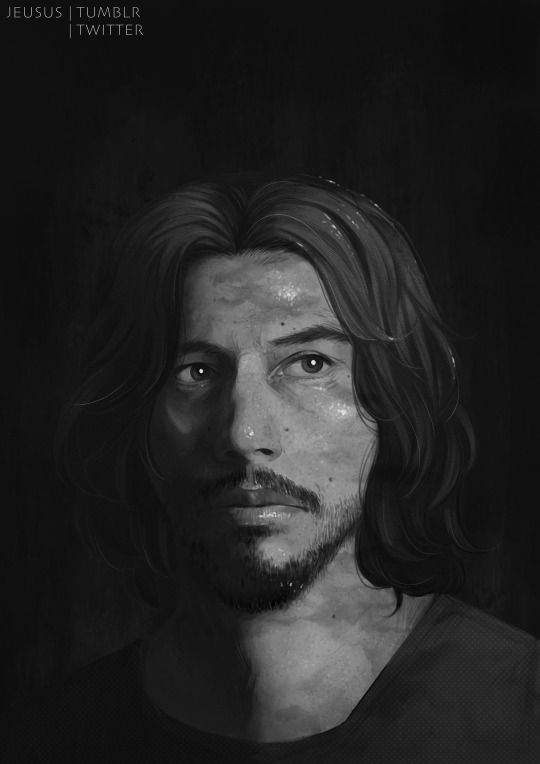Text
all fax no printer
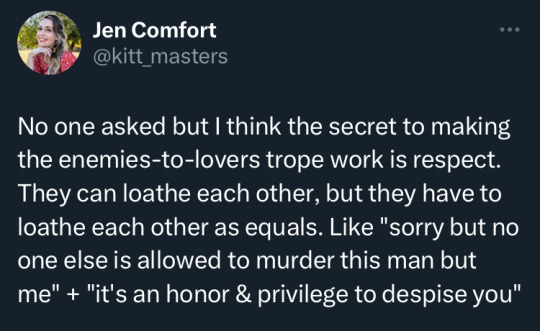
No one asked but I think the secret to making the enemies-to-lovers trip work is respect. They can loath each other, but they have to loath each other as equals. Like “sorry but no one else is allowed to murder this man but me” + “it’s an honor and privilege to despise you.”
38K notes
·
View notes
Text
@spock-in-awe yes!!!?? 💚
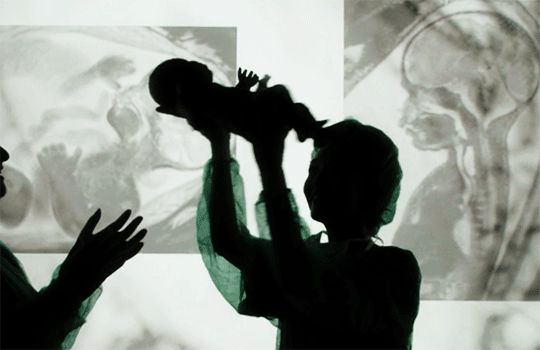

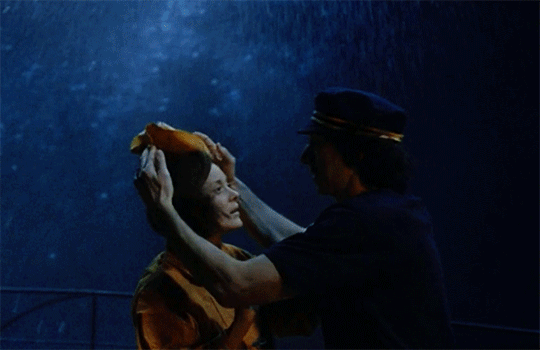
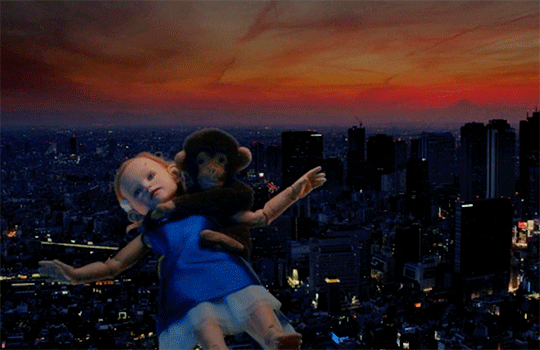

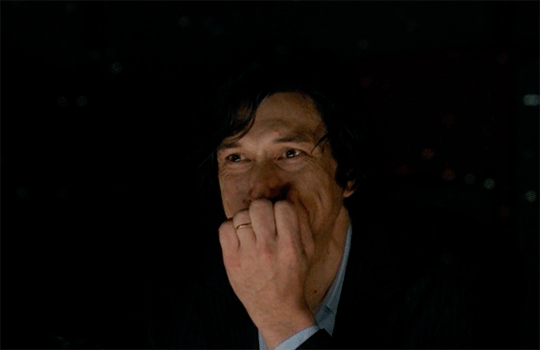
ANNETTE (2021) dir. Leos Carax
106 notes
·
View notes
Text
I'm really attracted to this man i fear

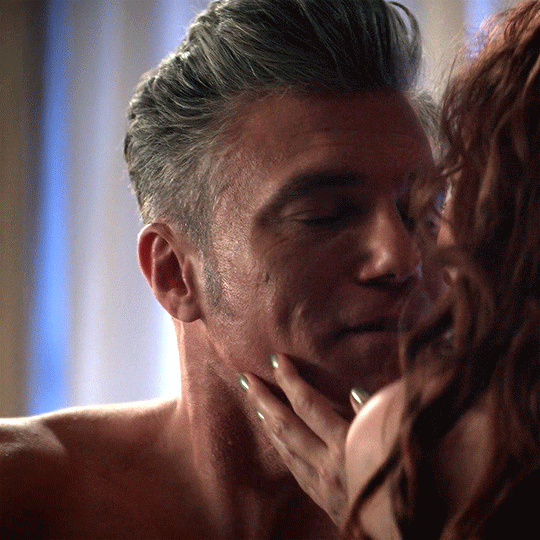
Anson Mount as Christopher Pike
— Star Trek | Lift Us Where Suffering Can't Reach
273 notes
·
View notes
Text
😏
Rewatching the Star Wars Lego Holiday Special with my brother and uh. What the fuck was this.
307 notes
·
View notes
Text
@spock-in-awe should I rewatch Annette ._.






ANNETTE (2021) dir. Leos Carax
106 notes
·
View notes
Text
@spock-in-awe thanks ♥️ Also, isn’t it kind of contradictory to call reylos “weirdos” in one breath but then also criticize them for making “dull cishet no plot” novels in the next? No need to tear each other down over this. Just write what you want to write (Unless it’s racist/insulting bs. Iykyk)
sad reality of the fanfic-to-published work economy is that the weirdest people are willing to do it. that's why there's now hundreds of shitty no plot cishet hate-to-love enemies-to-lovers books that are ex reylo fanfic. and it's not even good. that's because the people who wrote book-quality steve/bucky and kirk/spock fic are too normal to think to themselves "i should get this porn published". they're too busy working in local government offices
74K notes
·
View notes
Text
Yeah I just think it’s really rude to suggest Reylo fanfic writers are specifically undeserving or weird for getting published. If there wasn’t a demand for it, they wouldn’t be published. Simple as that.
sad reality of the fanfic-to-published work economy is that the weirdest people are willing to do it. that's why there's now hundreds of shitty no plot cishet hate-to-love enemies-to-lovers books that are ex reylo fanfic. and it's not even good. that's because the people who wrote book-quality steve/bucky and kirk/spock fic are too normal to think to themselves "i should get this porn published". they're too busy working in local government offices
74K notes
·
View notes
Text
#New character archetype unlocked #Liminal Space characters are the best characters #analysis #media
Hey, so, I made up a term and wrote a whole thing. Hope you enjoy.
Inspired by the concept of liminal spaces, liminal space characters are narratively stuck, their subjectivity seemed rendered inert. They are resistant to transiting to the next phase, on the brink of possible transformation if only they could figure out the how of transforming. However, this arrested character growth is designed by skillful hands to be temporary, and the resulting arc of change is heightened by that seemingly fixed–and problematically so–starting place.
An inherent trope among these characters is a bridging multiple worlds, identities, or contexts. They inhabit an “in-between,” a space of discomfort, uncertainty, waiting, and denial (relating to the personal, the public, or reality itself). Narratively, there might be an impending change on their horizon that they work to avoid, sacrificing pieces of their own ethical system to reach that aim. They might be running from their past actions, straddling multiple spheres of existence, or haunted by what they’ve done but unable to face the consequences. Others might be so committed to completing a task bestowed upon them they barely assess whether they are capable of even doing so. In worse emotional places are those characters who complete the task set before them, only to realize it was a horrible mistake.
At the root is their relationship to subjectivity. Who directed their understanding of self? When did that occur? Was it purposefully manipulative or purely environmental? To move through the liminal space, they must define their own subjectivity, and take control of their own identities after being buffeted by expectation, lineage, or limited opportunities.
One of the most persuasive liminal space characters of the last ten years is Ben Solo, or Kylo Ren, in the Star Wars universe. He is born under incredibly traumatic circumstances, his lineage being a splinter of the light side and the dark. Impossibly high expectations are thrust upon him before he enters the world, so too is a sinister invasion intended to corrupt him in the womb. He is purposefully kept ignorant of his grandfather’s actions, deprived of an opportunity to come to terms with the damage wrought those decades prior. Ben’s parents don’t quite notice how calculating the dark side is, or avoid doing anything about this understanding, until they send him to his uncle’s Jedi Temple. Even under his Master-level uncle’s observation, Ben struggles to integrate everything that is seemingly at odds inside him; the pull to the light, the pressure of the dark. Consequently, he is left in a state of fractured identity, split between what is acceptable and unacceptable, unable to find his place in a galaxy ruled by strict binaries. This tension boils to the surface as rage, violence, hopelessness, and subservience to those he turns after his family members fail him.
Another excellent example is Spock in the Star Trek universe. He is born half human, half Vulcan, a duality that leads to lifelong struggles not only within himself, but in the galaxy, as well. While he must suppress his emotions through training and social expectation, his internal system of rationality is encouraged during his childhood on Vulcan. Despite his father’s choice to partner with a human woman, Sarek seems to resent Spock’s individuality. In Vulcan schools, Spock is bullied by his peers for that part of his identity of which he has no control. In a more recent iteration of Star Trek, it is revealed that Spock also has a form of dyslexia, setting him further apart from those he might otherwise find a connection with. He is a unique individual, someone whose adversities aren’t recognized by those he encounters–let alone seen and validated–and so he is left to find a balance within himself with little support. His world is also one of defined boundaries, clear parameters for acceptable behaviors. This path isn’t easy for him, especially when he seeks to relate to those he finds himself drawn to, or forced to spend time with. Depending on the era of Star Trek, he deflects the advances of those around him, or falls under the influence of an alien biologic, for example, wherein he is allowed to express emotions, and later confesses that being under the pollen’s influence was the only time he felt happy.
Both these examples share a commonality: they are pushed a certain direction in response to family obligation, social expectation, or environmental constraints. This can even go as far as childhood abuse or neglect that carries on through their lives. From the clay of their childhood experiences, the liminal space characters are taught it doesn’t matter what they want for themselves; they must accept and perform an identity according to what people around them dictate as acceptable. For Ben Solo, it is dutiful Padawan to his own detriment, while as Kylo Ren, he is a conflicted tool used by those he bows to. Spock defaults to appearing as a distanced and capable science officer, hiding any internal tumult he may experience. Both have suffered for their struggles and crave relief.
For some, there is a distinct lack of agency often assigned, something that happened at the start of their journey that was entirely out of their control. Ji-Ah, a liminal space creature from Lovecraft Country, is possessed by a spirit that wreaks havoc on those she encounters. She did not consent to the spirit’s arrival–her mother invited it in for reasons all her own–and the human Ji-Ah loses her identity in the process. What is intriguing about this arc is how the spirit is the one to change, not the negated human within. That person was lost, replaced by a spirit who transforms for the better.
San, from Princess Mononoke, was abandoned by her parents in the forest. She was discovered by the Wolf Clan, whose leader Moro takes the human child in as her own to raise entirely as if she were a wolf. As San grows up with deep hatred of humans, she must confront the truth of her existence; that she comes from them, was abandoned by them, and now commits her life to stopping their destruction of the natural world. Her transition through the liminal looks similar to her starting place, living as a wolf, yet her internal conflict finds resolution through connecting with a human man she can trust.
To achieve their goals (which are usually not intrinsically motivated but outwardly so), they may suppress their innate tendencies. These often include compassion, empathy, tenderness, or caretaking. This leads to immense conflict, both externally as they aim to reach certain objectives, or internally as they combat or try to eliminate this intense intrinsic struggle. This conflict may cause violent behaviors, mental instability, or emotional chaos. When these characters are coded as “villains,” they often cause intense harm to others and themselves. They do this usually out of desperation to survive, to fit in, or perhaps to avoid perceived judgement. Depending on the narrative, they are given an opportunity to make amends for this harm. But usually in western media, they are not redeemed, let alone offered the chance to atone for the damage they inflicted while they struggled to actualize as their true selves.
The heroic versions, of which the Star Trek universe has many, benefit from extra layers of character depth, which offers an arc that builds effectively over several seasons. Whether it is an android who observes humans around himself and wishes to emulate their mannerisms, or a previous human-machine hybrid forced to sever herself from the greater machine organism, these characters depend on the external to define their identities. It takes much longer for them to find that truth within themselves.
Other characters fall into a middle ground between villain and hero coding. One such example is Ed Teach, or Blackbeard, in Our Flag Means Death. He inhabits the world as a fulfillment of his own stereotypes and exaggerations. He claims to care about little and presents a bravado to match the fearsome illustrations in history books. But eventually we see his immense dissatisfaction with the role he has been performing. His liminal space, similar to the rest, is that of moving away from this project front toward authenticity.
Joel Miller, a character originated in the Last of us video game and portrayed in a streaming show of the same name, begins as a regular man. He has a daughter, a brother, a job. It is only because of horrifying circumstances that he is forced to transform. He makes himself cold, violent, and ruthless. There can be no remainder of his previous self. Until he encounters someone to protect, and protect, he does, much to his own aggravation. His circumstances are some of the most dramatic across narratives, and how he integrates, or fails to integrate, his warring selves has fascinated audiences for over a decade.
Neither of these previous two examples have conclusions in their streaming narratives at this point. Both are left on the cliffhanger of violence, of rejection of social expectation around them. Both revert to a previous state of being, but in different ways: Ed to his Blackbeard persona, Joel to his protective father role. Whatever results from these decisions (however conscious or reactionary they are), is inconsequential. And therefore, potentially read as villainous once more, buckling under the pain of the past and fear of that suffering’s return.
The character Spike in Buffy the Vampire Slayer willingly suffers for his previous actions. Over time, he begins to recognize what he has done, takes action to make amends, and fights for his redemption. Though by the closure of the show he is deprived of what he most craves–connection–his final actions are entirely the opposite of his original ones. He countered the vampire tendencies within himself, found wholeness, and dedicated himself to a goal that was selfless.
As Spike was for some time, these characters can be confused about where they belong and crave that understanding and connection. There is a deep ache to be understood, though few of them acknowledge this desire. In fact, many go out of their way to deny it, to pretend otherwise.
The character of Nimona, originating in the graphic novel of the same name, traverses the murky landscape of being a shape shifter. She camouflages her deep interest in finding a companion by presenting herself as a “sidekick,” someone for the villain mastermind to rely on and trust. She is uncertain of herself, carrying the wounds of centuries past, convincing herself that violence and domination are paramount. When she bonds with her new friend in unexpected ways, her deeper needs rise to the surface. But these are frightening. It is only when she is shown radical acceptance and safety does she integrate her various parts at the end of the story.
Killian Jones in Once Upon a Time jostles between presenting his desires in a joking manner, and hiding them beneath layers of anger. He is bound by revenge and denies anything in conflict with that goal. His swagger is an exaggeration, a front or projection, which is a common detail across these stories. If he claims to be a heartless villain, no one will discover just how victimized he once was.
These characters may herald chaos or drama within the narrative, amusement or disquiet for the audience. A character like Draco Malfoy in the Harry Potter series is written from the outset as a direct–if youthful–antagonist. Yet later in the story, insight into his wounded mental and emotional state arrives, eliciting the reader’s compassion. He was inculcated in an environment of bigotry and toxic superiority, of which he must decide personally to move beyond.
Liminal space characters can appear unique in their behaviors and presentations when compared to those around them. Perhaps this is because of a heightened defensiveness, or anxiety, or refusal to engage with typical romantic situations.
For those who are deliberately off-putting and aggressive, sarcastic and aloof, or extremely isolated by design, the audience must confront their own biases, as well. When the narrative is effective, we as consumers may empathize with these struggling individuals. We may understand why they have taken the steps they have, protected themselves, lashed out at others.
What I love most about liminal space characters is the potential for them to heal the dueling perspectives within themselves. These characters at some point must question themselves, and when done successfully, the audience does the same: How capable are we of forming our sense of self? What does harm look like? How do we live with our mistakes? How do we shape ourselves? Is it possible to make a new choice after a long pattern of harmful behaviors? Where does this character go after discovering they have wronged so many? When is that redemptive effort enough?
Both the characters questioning themselves, and not questioning themselves (ie following external demands), may lead to feelings of loneliness and rejection. Prince Zuko of Avatar the Last Airbender rotates entirely around his father’s acceptance, and whatever he must do in order to receive it, he will. There is no cost too high, and he questions nothing. Until he stumbles into a bond with a supposed adversary, which begins to shift his perspective. This is a common trope within these stories, as well, the mirror opposite coming into sharp relief by comparison.
Frustratingly, there are far more male-presenting liminal space characters than female ones in the duality of Western media, so the “adversary” is often portrayed as female (I’m optimistic this will change as more diverse writers share their stories). In a compulsory heterosexual context, there is potential for romance, as well. This is perceived in the canon text and also by fans through their own stories. An opposing character–such as Kitara in Avatar the Last Airbender, Rey in the last Star Wars trilogy, or Captain Kirk in Star Trek–may help these liminal space characters realize they are not a lost soul, no longer a victim to their circumstances. They can offer an opposing viewpoint: what if you took a different path? You’re not required to stay this way. It’s never too late.
Hope gives the liminal space characters the sense they can make new choices and change. Hope is the kernel, the light slanting through clouds, the assurance nothing is permanent, not even a limbo state of the mind.
32 notes
·
View notes
Text
FYI - if you were following me on Twitter, my new temp account is @fangirlfelon
1 note
·
View note
Text
a very important fanfic announcement
Hey. Hi. You should know I’m making a sequel to my Kylo x Reader fic, Reply All, Please.
Coming soon to an AO3 near you.
Okay, that’s it. bye.
5 notes
·
View notes
Text
A Dino Place - Chapter 5: Choke

65 million years ago, Commander Mills crash landed on an uncharted planet. Stranded and stricken with grief, he was prepared to end it all...until he met you, the only other survivor of the crash. Together, there's chance for survival. But not everything is what it seems with his new companion, and the commander soon learns you have an appetite for something deeper and far more insatiable than that of the carnivorous lifeforms which rule this world.
AKA - in which hungy dinos and steamy compulsions abound (and I don't mean geysers).
--
Read Chapter 5 on AO3
2 notes
·
View notes
Text
A Dino Place - Chapter 4: Sting

65 million years ago, Commander Mills crash landed on an uncharted planet. Stranded and stricken with grief, he was prepared to end it all...until he met you, the only other survivor of the crash. Together, there's chance for survival. But not everything is what it seems with his new companion, and the commander soon learns you have an appetite for something deeper and far more insatiable than that of the carnivorous lifeforms which rule this world.
AKA - in which hungy dinos and steamy compulsions abound (and I don't mean geysers).
--
Read Chapter 4 on AO3
3 notes
·
View notes
Photo
he’s gorgeous, your honor
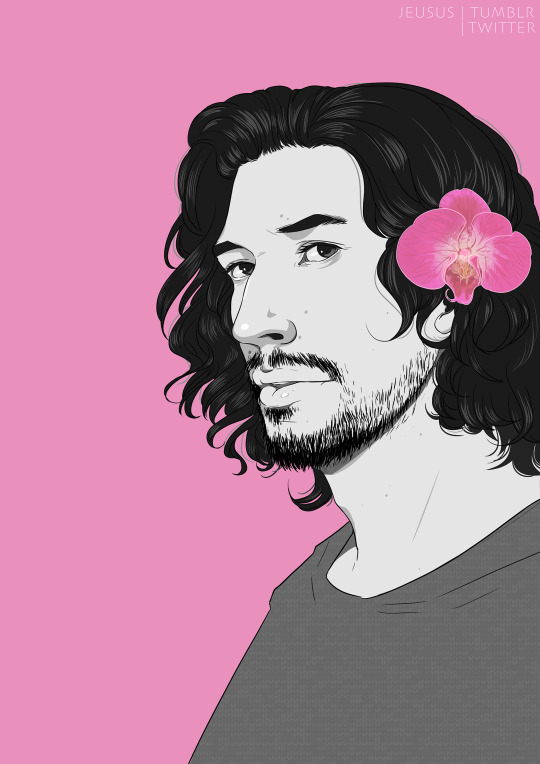
#GirlDad Mills
839 notes
·
View notes
Text
A Dino Place (Mills x Reader) - Chapter 3

65 million years ago, Commander Mills crash landed on an uncharted planet. Stranded and stricken with grief, he was prepared to end it all...until he met you, the only other survivor of the crash. Together, there's chance for survival. But not everything is what it seems with his new companion, and the commander soon learns you have an appetite for something deeper and far more insatiable than that of the carnivorous lifeforms which rule this world.
AKA - in which hungy dinos and steamy compulsions abound (and I don't mean geysers).
__
Chapter 3 is upon AO3
#Bite#fanfiction#ao3#smut#horror#dinosaurs#65#adam driver#reader#mills#alien peen#what am i doing with my life
2 notes
·
View notes
Video
undefined
tumblr
Succession S4 is here, which means this song is gonna be the highlight of my sundays
4 notes
·
View notes
Text
A Dino Place (Mills x Reader) - Chapter 2

65 million years ago, Commander Mills crash landed on an uncharted planet. Stranded and stricken with grief, he was prepared to end it all...until he met you, the only other survivor of the crash. Together, there's chance for survival. But not everything is what it seems with his new companion, and the commander soon learns you have an appetite for something deeper and far more insatiable than that of the carnivorous lifeforms which rule this world.
AKA - in which hungy dinos and steamy compulsions abound (and I don't mean geysers).
__
Chapter 2 on AO3
#adam driver#65#Mills#Reader#reader insert#i'm in my dino era#fanfiction#ao3#archive of our own#buzz buzz
0 notes
